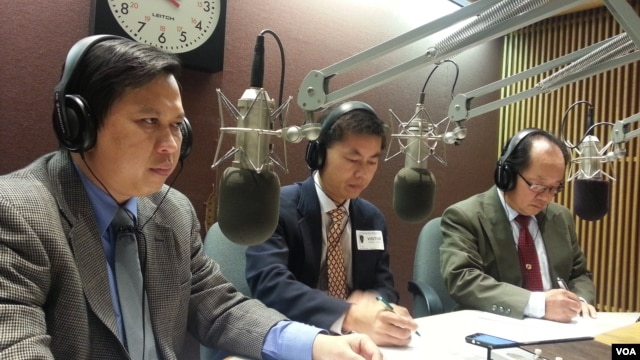09 November 2012
WASHINGTON DC - Cambodian-American political activists say they hope
the re-election of President Barack Obama will mean an improvement in
the economy, less partisanship and improved international relations.
Jobs remain a top concern for many Americans, as is the deficit, said Schanly Kuch, who works at the Education Department in Maryland and was a guest on “Hello VOA” Thursday.
Tung Yap, a civil engineer and head of Cambodian Americans for Human Rights and Democracy, an advocacy group, said Obama will have to work with Congress to advance his policies. “Unlike Cambodia, where when the prime minister opens his mouth, others have to listen,” he said.
Alongside his domestic agenda, Obama is turning toward world affairs, including in Asia, where his administration has increased its engagement this year.
Schanly Kuch said this has meant improving partnerships in Western countries, “and small countries in Asia, and Asean, in order to heal wounds and make alliances stronger.”
Obama is expected in Cambodia later this month, for a series of Asian summits, including an annual Asean meeting chaired by Cambodia.
Ou Kim Huot, a student at Penn State, in the US, said this reflects US concerns over China. The Democratic administration of Obama will not be as effective at this as the Republicans, in his view, he said. Meanwhile, Cambodia needs to continue to find self-reliance in foreign affairs, to find solutions to its own problems.
However, Suy Seng Hong, who lives in Florida, said he supports Obama’s foreign policy and his using “less force, less weapons, and less money” to achieve foreign policy goals. “I hope that President Obama…will use his power and leave a good message for Cambodians to follow the US,” he said.
Prom Saunora, who lives in Virginia, said he hoped Obama will continue to push for human rights and democracy in his Cambodia visit. “For Cambodia, I understand that he will try to solve our country’s problems in freedom, democracy and the respect of human rights,” he said. “He will raise these issues with Hun Sen. I think he’ll do that.”
Jobs remain a top concern for many Americans, as is the deficit, said Schanly Kuch, who works at the Education Department in Maryland and was a guest on “Hello VOA” Thursday.
Tung Yap, a civil engineer and head of Cambodian Americans for Human Rights and Democracy, an advocacy group, said Obama will have to work with Congress to advance his policies. “Unlike Cambodia, where when the prime minister opens his mouth, others have to listen,” he said.
Alongside his domestic agenda, Obama is turning toward world affairs, including in Asia, where his administration has increased its engagement this year.
Schanly Kuch said this has meant improving partnerships in Western countries, “and small countries in Asia, and Asean, in order to heal wounds and make alliances stronger.”
Obama is expected in Cambodia later this month, for a series of Asian summits, including an annual Asean meeting chaired by Cambodia.
Ou Kim Huot, a student at Penn State, in the US, said this reflects US concerns over China. The Democratic administration of Obama will not be as effective at this as the Republicans, in his view, he said. Meanwhile, Cambodia needs to continue to find self-reliance in foreign affairs, to find solutions to its own problems.
However, Suy Seng Hong, who lives in Florida, said he supports Obama’s foreign policy and his using “less force, less weapons, and less money” to achieve foreign policy goals. “I hope that President Obama…will use his power and leave a good message for Cambodians to follow the US,” he said.
Prom Saunora, who lives in Virginia, said he hoped Obama will continue to push for human rights and democracy in his Cambodia visit. “For Cambodia, I understand that he will try to solve our country’s problems in freedom, democracy and the respect of human rights,” he said. “He will raise these issues with Hun Sen. I think he’ll do that.”


No comments:
Post a Comment